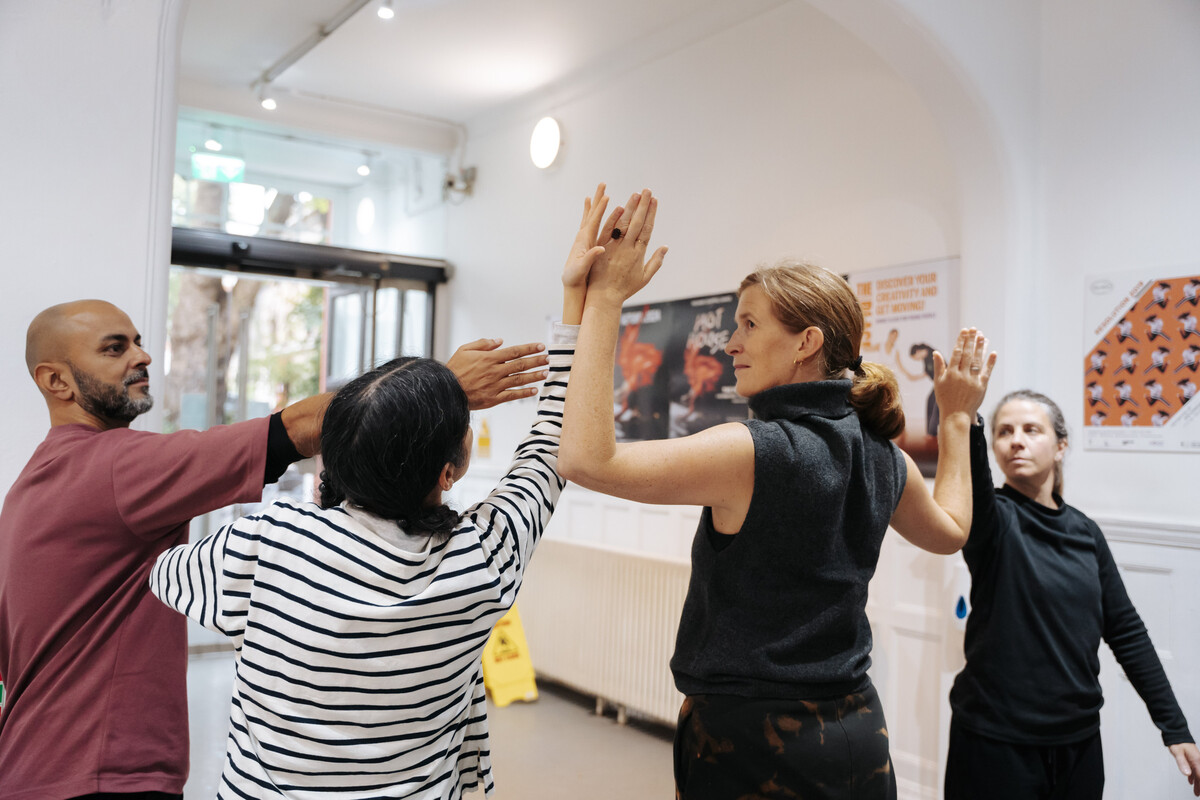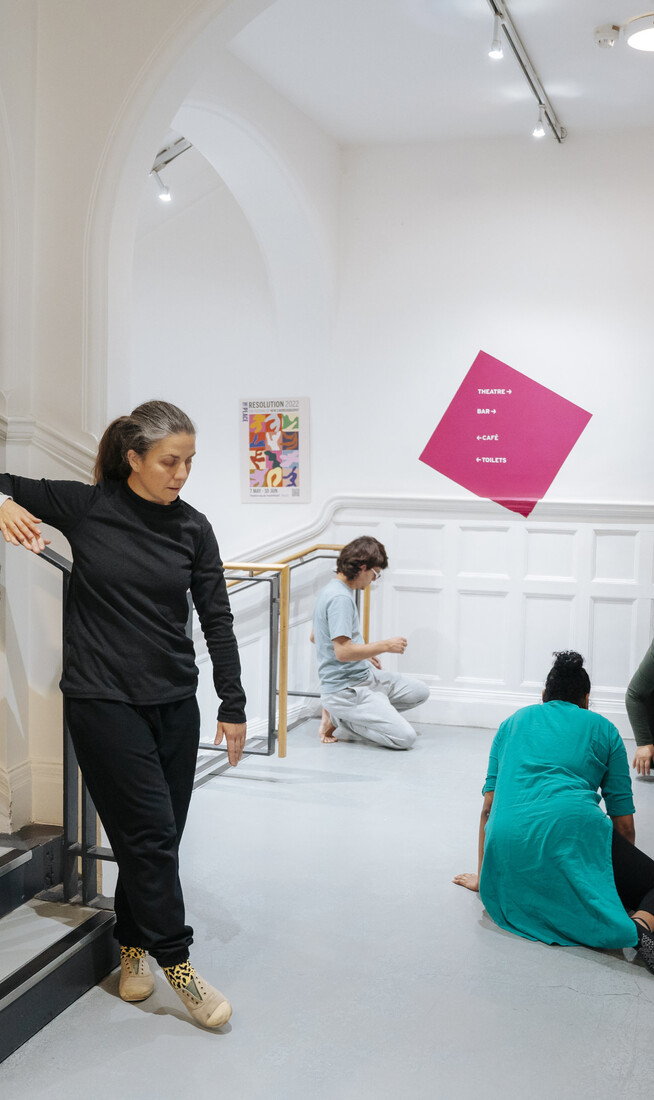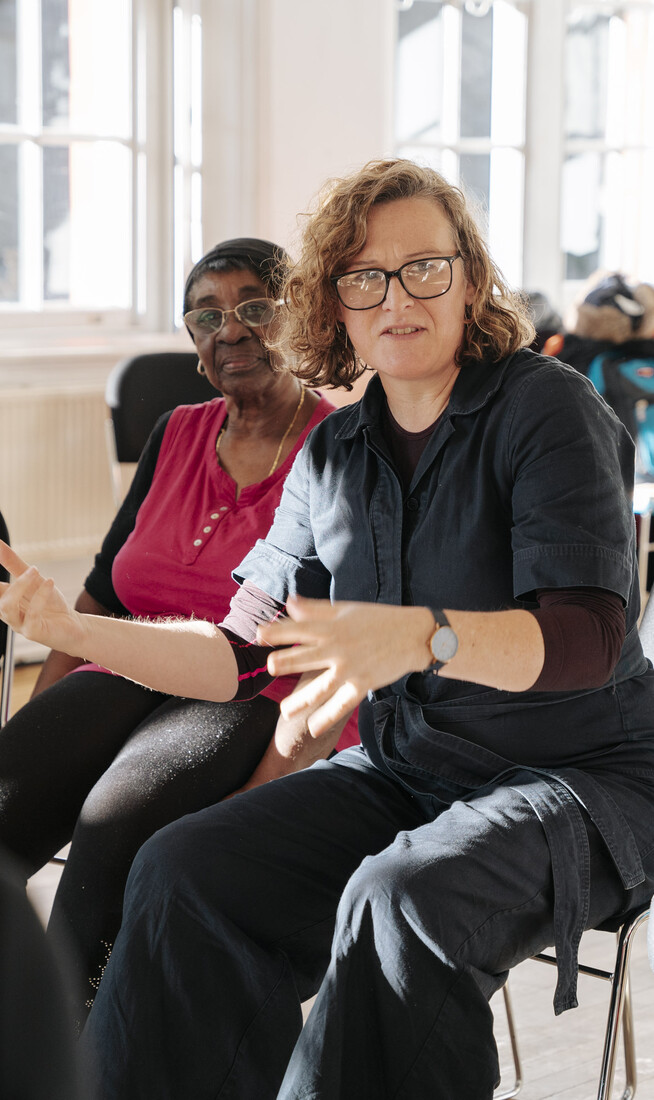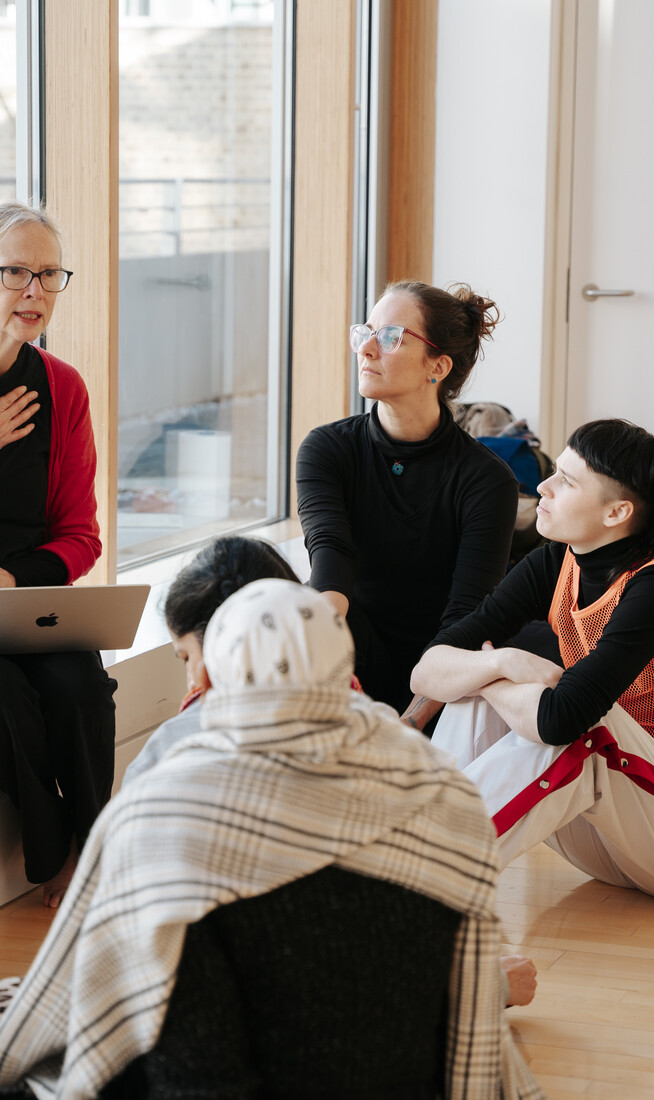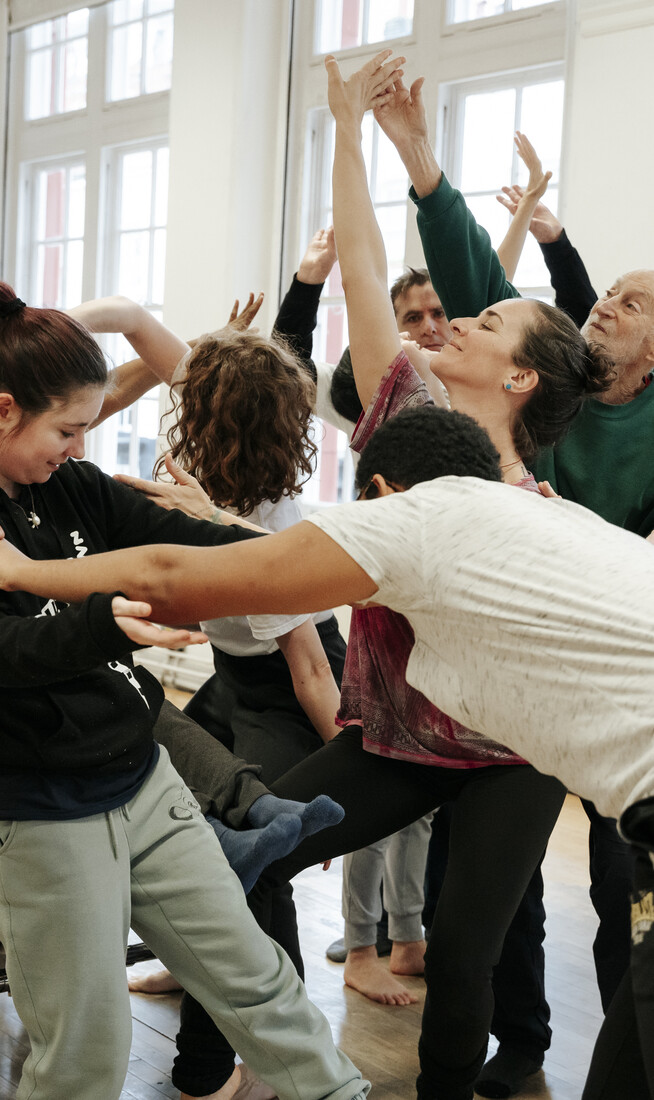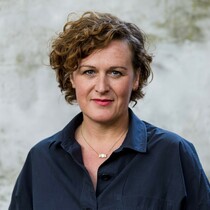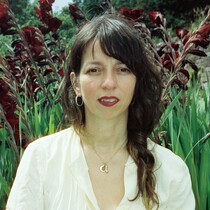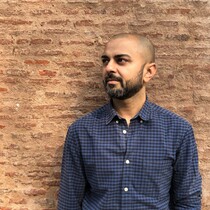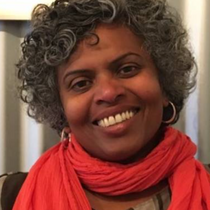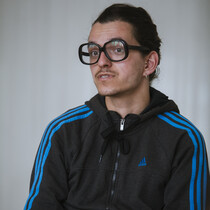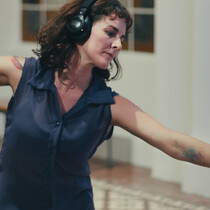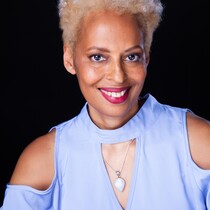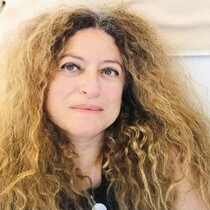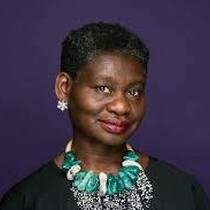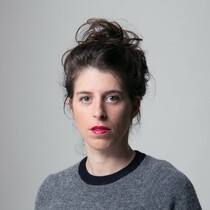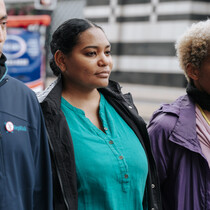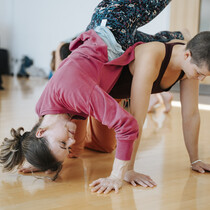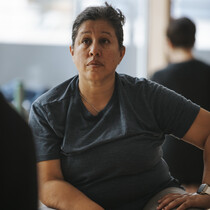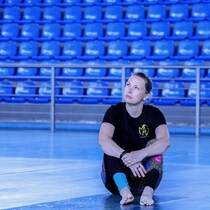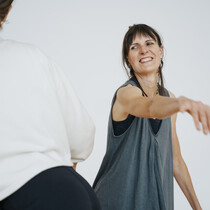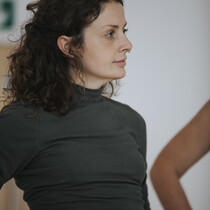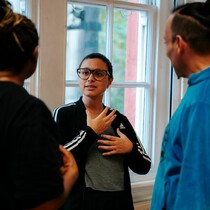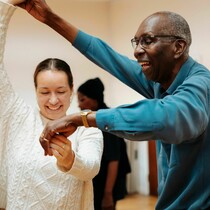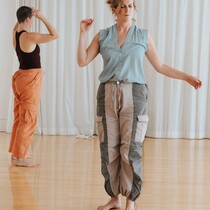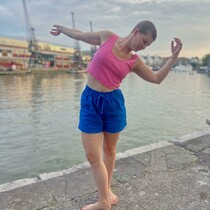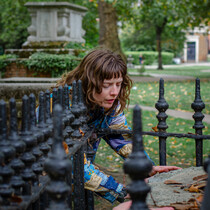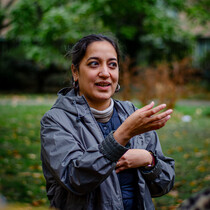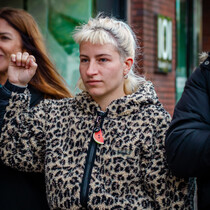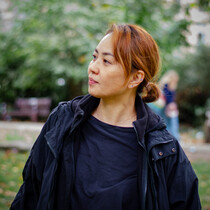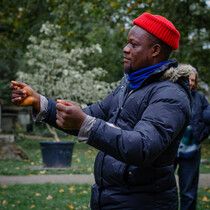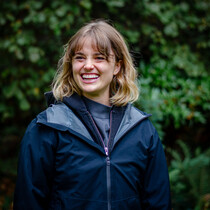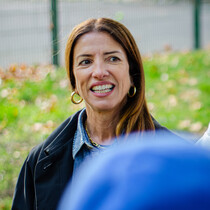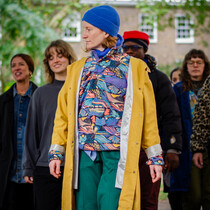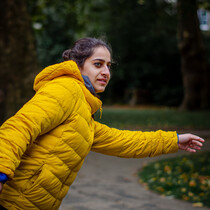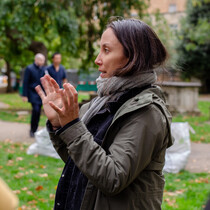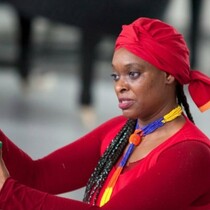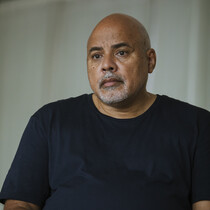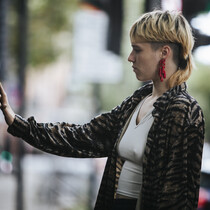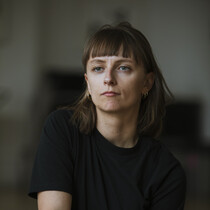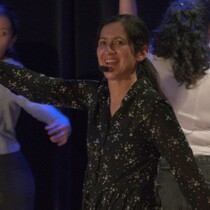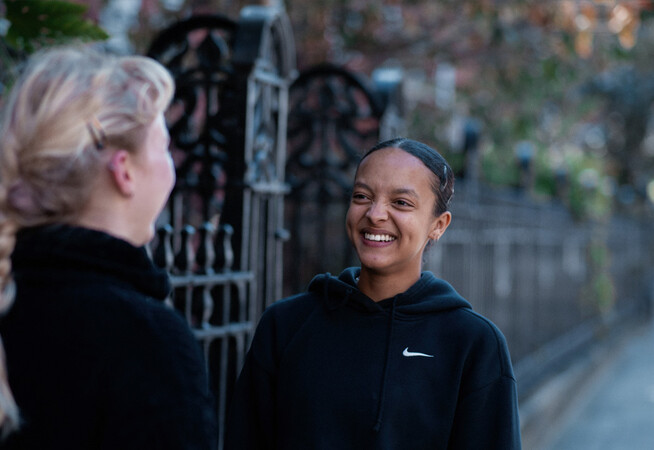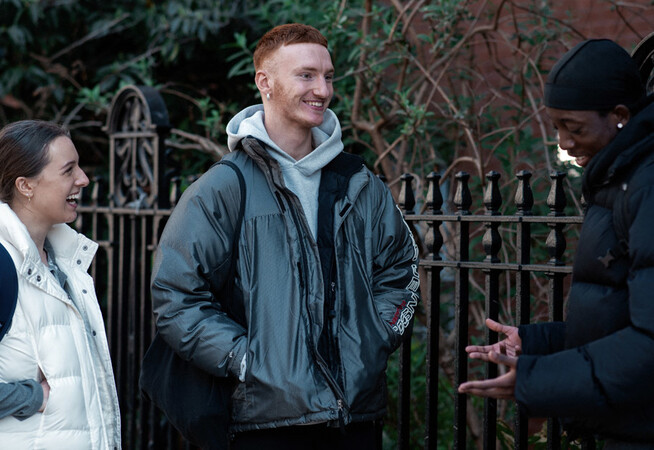MA Dance: Participation, Communities, Activism
Validated by University of the Arts, London
- Applications
- Open
- Course length
- 1 Year Full Time / 2 Years Part Time
- Start date
- Sep 2026
Upcoming Events

Online
Online Information Session
MA Dance: Participation, Communities, Activism

On Tour
In-Person Workshop in Thailand
MA Dance: Participation, Communities, Activism

Online
Online Workshop in China
MA Dance: Participation, Communities, Activism

On Tour
In-Person Workshop in Singapore
MA Dance: Participation, Communities, Activism
Work local, learn global, create change

This MA is for students who want to develop a socially engaged dance practice which addresses the urgencies of our times. You will join a global community of artists and researchers working at the intersection of community dance and arts activism. You may have an emerging community, participatory or activist movement practice which you want to develop, or you may be an established maker who wants to interrogate and develop your practice in the light of the shifting discourses and challenges of the moment.
This unique Masters, offered full-time or part-time, has an intensive residency model. You engage in two, 2-week live residencies per year based at LCDS in London. All other teaching and learning is online, allowing you to remain embedded in the communities with whom you practice, growing your work as you study. You are not required to relocate to London, indeed the course places the de-centred practice of the individual student in their specific context at its heart. The richness of the curriculum grows from the wide diversity of geographical, cultural and contextual situations of our students and staff.
The course can be completed in one year full-time, or two years part-time, and the next cohort begins in September 2026. It is designed to allow you to study alongside work, caring responsibilities or your need to pace your learning to suit your individual needs.
We are offering two full scholarships to those living and working in the Global South. Read more about this in the Fees, Funding and Scholarship section.
This course explores the potential of movement and dance to contribute to the creation of sustainable social structures, to support individuals and communities, to rehearse and perform collective actions and to challenge systemic inequity. You will situate your work in an international network of peers, artists, scholars and teachers, challenge and develop your individual practice and apply your learning in an individual creative project, supported by one to one mentoring.

- Develop your artistic approach to dance including its social, ethical, activist, aesthetic and pedagogical dimensions
- Be supported in your development working for the advancement of social justice across the fields of community and participatory dance and activism
- Encounter, interrogate and negotiate systemic contexts, activating dance as a methodology for change

- Locate your practice in historical and contemporary discourses around socially engaged arts practices
- Develop appropriate skills and knowledges to lead safe, creative, accessible, ethical and enquiring dance projects in a variety of settings
- Develop advocacy skills and activist values to influence the contexts in which you work
- Analyse and reflect upon the efficacy of your practice and its relationship with the communities of practice in which it is embedded
Key Information
What will I be studying?
Two out of the three units have a two-week intensive, at The Place in London, at the beginning of the unit.
Unit 1: Mapping Co-Creative Communities
This unit maps a wide range of participatory/community/activist dance practices around the world. Through exploring the work of your peers, teachers and guest artists working with multiple approaches, you will situate your own practice in a wide context. Theoretical and practical inputs are applied continuously in the setting in which you practice, enabling you to investigate new ideas and impulses practically and then reflect upon your learning with your community of learners. We interrogate the key terms of the MA: participation, communities, activism. You have an individual student placement in this unit.
Unit 2: Learning in Collaborative Practice
Unit 2 leads you through a process of sifting through the learning in the previous unit, supporting you to identify and investigate your areas of interest. You will develop your practice-based research in practical collective micro-processes with your peers and communities. Critical reflection will anchor the development of your unique creative practice. Your personal mentor will support you to identify your research questions and to imagine and plan your independent project.
Unit 3: Encounter in the Creative Process
You will integrate your learning throughout the course to deliver an embedded practice-based, artistic research project with a community. Self-reflective analysis of your process feeds into a final presentation in a student-led symposium. Your mentor will continue to support you throughout this process.
Entry Requirements
The standard minimum entry requirements for this course are:
• BA (Hons) degree or equivalent academic qualifications
• Alternative qualifications and experience will also be taken into consideration
• Personal statement, outlining how you intend to use the course to expand your current practice
• Video submission
If you don't meet the above requirements, you might still be considered with additional strengths or alternative evidence such as:
• Related academic or professional experience in in dance, film, arts, media, fine arts, performance, or similar field
• The quality of the personal statement and video submission
• A strong academic or other professional reference
• A combination of these factors
English language requirements
IELTS level 6.5 or above, with at least 5.5 in reading, writing, listening, and speaking
Student Visas
One of the unique things for us about this course is that overseas students can study without needing to apply for a student visa (as long as you are not resident in the UK in the times in between the two-week intensives)*. However when attending the onsite residencies, you may need to apply for a Standard Visitor Visa, click here to find out if you would need to apply. More information on visiting the UK as a visitor can be found here.
*We are unable to sponsor a Student Visa for this course, therefore overseas students will not be able to live in the UK for the duration of the course.
How do I apply?
First, you are required to complete our online application form where you input details about yourself, your educational and employment history, a video submission (which acts as your portfolio of work) and a personal statement about why you want to join MA Dance: Participation, Communities, Activism.
In order to prepare for submitting your application you can read our video submission guidelines here.
You can write or audio record your personal statement. You may want to talk about some of the following:
- Your interest in MA Dance: Participation, Communities, Activism
- Your relevant experience or abilities
- What you would like to achieve on the course
- How you hope this course can help you to realise any goals you may have
- Why you think you are ready for a Masters course and your reasons for choosing London Contemporary Dance School
Use the statement in a way that best represents your current context and practice. We ask that you submit no more than 500 words.
You will then be contacted by our Admissions Team who will let you know if you have been invited to a one-to-one interview with us. This will take place online. We ask you to critically reflect and evaluate your portfolio and the application of your practice to future developments.
After the interview, please allow up to 2 weeks to hear an outcome from our Admissions Team.
Fees, Funding and Scholarships
Fees for 2026/27 can be found here
Global South Access Scholarship
We offer two scholarships for students living and working in the Global South.
You apply for the scholarship through the online application form for the MA Dance: Participation, Communities, Activism course.
Each scholarship covers the overseas course fee in full (£21,900).
To be eligible for this scholarship, you must live and work in one of the countries of the Global South, either permanently or regularly, and intend to complete at least part of your MA course living and working in that country.
If offered an interview, you will be asked to provide evidence of an existing artistic practice with communities in the country.
It does not have to be your official place of residence.
To be eligible for a Global South Access Scholarship, you must live and work on a regular basis in one of the countries on the list from the Finance Center for South-South Cooperation: Organization in Special Consultative Status with ECOSOC of the United Nations.
Decisions on scholarships will be made based on two factors:
1) Financial need - this will be assessed at the point of your application to the course. There will be a series of questions that will help us evaluate your financial need.
2) The quality of the submissions and interview in the application process
The scholarship cannot be combined with other fee-waiver scholarships (the student must be self-funding).
The scholarship can be combined with other scholarships which support travel or living costs.
The student must enroll on MA Dance: Participation, Communities, Activism before the funding is released.
*Our definition of countries of the Global South is drawn from the Finance Center for South-South Cooperation: Organization in Special Consultative Status with ECOSOC of the United Nations.
Other funding and support available:
You can also apply for the Student Fund after an admission offer is made to you. It has been developed to support and relieve some of the financial pressures students face, making it possible to enrol and remain on our courses. In 2021-2022 The Student Fund supported 93 students to the amount of around £150,000.
Frequently Asked Questions
What is MA Dance: Participation, Communities, Activism?
The course asks what kind of artistic processes in and of the body we need to address the urgencies of our time. You will work with a community of students, artists and researchers developing creative encounters which contribute to the evolution of sustainable, fair, equitable societies while also questioning and disrupting the contexts in which the work is situated.
Who is the course for?
This course is for you if you want to critically explore the intersection of dance-making and activism. You will have the beginnings, or indeed an established, socially-engaged practice which works with people, communities and institutions to effect change. The course centres your creative process and supports you in the interrogation and development of your work, positioning it in creative exchange with an international network of peers, artists and researchers. We are receiving applications from artists who are emerging as well as artists who have decades of experience and want to interrogate their practice in the light of the seismic social shifts of the last few years. This diverse group of students are a key resource for the exchange of learning.
What are the outcomes of the course? What will I learn and what will I be able to do afterwards?
Your individual artistic development sits at the centre of this course. You will leave with a clearer artistic identity, knowing more about your own practice and having critically reflected upon it in the light of recent discourses in the field. You will have been supported by staff, peers and mentors to develop an area of research and explore it practically with a community. In the final unit, you will deliver a project which can act as a bridge to the next step of your career. You will have developed your facilitation skills and refined the language to talk about your work, pitch ideas and approach partners for fundraising. The course will expose you to the work of a huge number of artists around the world and you will be integrated into a network of exchange and collaboration with them. You will be equipped to work as a freelance artist, with the creativity, resilience and contacts to sustain your practice. Graduates will have the skills and connections to conceive and lead projects for organisations in the arts, NGOs, or in education, social or healthcare sectors. You may also wish to continue your studies to work in Higher Education.
How will I learn?
This is a multi-perspective, multi-centred learning context. Students are not asked to relocate their practice to London, but rather intentionally left embedded in the communities with whom they work. For this reason, much of the delivery of the course is online. You will be able to apply your learning immediately in the context in which you work, trying out how learning can work in your context and being supported as you do this. Alongside lectures, readings, discussions and classes with an international team of experts, you will collaborate and create in the digital space with your peers - and also with the communities with whom they work. The digital space is conceived as a collective creative space allowing transnational collaboration. We seek to co-create spaces of international creative exchange which are sustainable in a climate crisis, because they do not require large numbers of people to travel long distances. We are also driven by the desire to lower barriers to access as the ability to travel is a privilege which is not available to many people.
Can you tell me about the two live residences?
The course offers two, two-week long intensive residencies where the student cohort comes together in London to exchange in workshops, visits to projects and creative collaboration. You will work full-time at The Place, London for these weeks, with workshops in the daytime and visits and social events at the weekends and some evenings. These workshops will be led by staff and the Curatorial Team alongside invited guest artists and academics. You will visit established and inspiring socially-engaged projects in London and meet artists who have pioneered participatory and community work in the UK. The residencies take place in September and January every year.
Can I work while I study? I am a parent, will the course be accessible for me? I am a disabled artist, can I take the course?
Yes. You can take the course full-time or part-time, allowing you to combine your studies with work or caring responsibilities or if you want to manage the pace of your learning to suit your individual needs. We want to work with students who bring a wide variety of experiences and see this as a valuable resource in our collaborative work. We will do all we can to support you accessing the course and combining it with the responsibilities you hold and the support needs you have.
How many contact hours per week are there?
In the online teaching which forms the majority of the course, full time students have 12-15 hours per week of live contact time spread over three days per week. Placements, tutorials, mentoring and guided independent learning are additional.
Part-time students have 8-12 hours of live contact spread over two (occasionally three) days per week. Placements and mentoring are spread out over a longer period for part-time students.
You will also have asynchronous learning in the form of digital resources and readings to prepare for live sessions, as well as being asked to apply your learning in your context after live sessions. Tasks, proposals, scores and inspirations will support you in this.
What does an online week look like?
Depending upon which year and term of your studies you are in, the online week will have different structures.
Year 1 students usually have classes on Mondays and Thursdays. Year 2 students have classes on Tuesdays and are sometimes working online on Mondays too. Wednesdays have no group activities online and are devoted to independent learning in your context. You will be asked to apply your learning on this day in the context where you are situated. You may have tasks, scores and readings to complete. You may have individual tutorials, do your placement or meet with your mentor on Wednesdays. You can use Wednesdays and Fridays (when there is no online teaching) to engage with asynchronous resources in preparation for the next week. These may include: video lectures, readings, podcast episodes and more.
What time in the day will we meet online?
Our students live and work around the world so we navigate many different time zones. Once the student cohort is established, we will identify the times of day which best suit all students. This has often been between 12 noon and 6pm GMT/London but we cannot guarantee that will be the case with a new cohort. Times of sessions will be set in July when we have the locations of the selected student group.
Who will teach me?
The course has been co-written and is led by Jo Parkes who is an award-winning Community Dance artist with an international reputation for work in many different contexts. Recently returned to the UK after almost two decades based in Berlin, Germany, she is founder and director of Mobile Dance, a not-for-profit company which works at the intersection of artistic, social and political concerns. In her own attempt to resist inherited hierarchies and de-centre singular positions, she has chosen to curate the content of the course with a team of international artists and the student body of the course. We try to make decisions with groups of people with different positions and staff and students understand themselves as co-learners. Students often engage in peer to peer learning.
The Curatorial Team who curate the curriculum teach on the programme and invite guest artists into the programme. The Curatorial Team works on the principle that all invited guests should work in a different country, and ideally on a different continent, to the person issuing the invitation thus continually widening the geographical spread of teachers on the programme. The programme has a wide network of artists and organisations interested in offering mentoring and placements to students.
You can see the history of the Curatorial team and its current members here.
Do I need to arrange my own placement?
If you are accepted onto the course, the staff will collaborate with you to set up your placement. In conversation with the course team, you will identify artists and organisations with whom you may want to do your placement. The team will support you as you approach these. Some students might know an artist or organisation with whom they want to work, some might want to draw on the networks of The Place or the Curatorial Team, others might have an area of work where they want to gather experience and need support researching the best placement. We will work with you to help you to arrange a placement which expands your experience and feeds your interests.
Why do you set themes for each year?
We do not believe that there is ONE curriculum that every artist with a socially engaged practice should learn. Our curriculum responds to developments at the cutting edge of the field and has space to respond to emerging concerns and discourses globally and locally. It is co-created with students and develops in response to their questions, concerns and needs. We situate knowledge and skills which we find essential (e.g. safe practice, ethical structures and practices, facilitation of groups) in its specific context and seek to understand how specific practices in specific contexts meet more universal considerations. The themes run as “red lines” through the year, focusing the attention of students, staff and guests onto areas of work relevant for the current moment.
What funding support is available?
The Place offers two fully funded scholarships to students whose work is located in a country of the Global South. We also have a student fund to which all students can apply. You can find the links to financial support on the website. We are happy to support you in your fundraising by, for example, sharing information and networks or writing letters of support. Contact Jo Parkes if you would like to meet to discuss your own fundraising: jo.parkes@theplace.org.uk.
We recognise that we sit within a Higher Education system which demands student fees and that this creates barriers to access. We are working hard to reduce these.
Did we miss anything?
We are happy to answer any other questions you have. Feel free to contact the course leader Jo Parkes: jo.parkes@theplace.org.uk.
Summary Documents

Get a deeper insight into the course
By Course Leader Jo ParkesCourse Overview
Documentary by Marisa Zanotti and the learning community of MA Dance: Participation, Communities, Activisma practice for living together
Meet the Course Team
The curriculum is co-curated by an international team of artist/researchers. In this way, we seek to practice co-creation and multi-centred exchange in the structures of the course. The staff team of 3 is joined by a number of guest curators each year.
Each year, the Curatorial Team sets three themes which weave through the units of the course.
The themes for 2024-2025 were: Care, Crossings and Resistance
The themes for 2025-2027 are: Persistence, Proximities, Repair
The Curatorial team working with Jo Parkes in 2025-2026 are:
The retiring guest Curatorial Team members who accompanied the course in its first two years and who will continue to teach on the course in the future are:
Guest teachers working with us since our inaugural year in 2023 include:
Roshmi Lovatt, Alejandra Gissler, Lucinda Jarrett, François Matarasso, Andrea Marton, Orrow Bell, Tanin Torabi, Lauren Potter, Andrew Sanger, Tom Hastings, Jay Jordan, Rosemary Lee, Luca Silvestrini/Protein, Ingrid Molinos/Amici, Olu Alatise, communities of dancers at ASKI and Posh Club Hackney (facilitated by H), Katie Coe, Sangeeta Isvaran, Las Tesis, Nitipat Ong Pholchai, Sallisa Rosa, Jared Gradinger, Simone Kenyon, Krissy Marty/Forklift Dance Works, Vidya Patel, Kate Marsh, Parijat Desai, Gillie Kleiman, Lucia Rainer, ARK collective, Epic Arts, Lovisa Gunnarsdóttir, Filip Kijowski, Shivaangee Agrawal, Thea Stanton, Dana Caspersen, Camp Breakerz, Nisha Abdulla, Marc Bratcher, Sri Vamsi Matta, Okala Elesia, Guerrilla Marika, Theo Clinkard, Emma Houston
2024-2025 Cohort
Meet the 2024-2025 cohort, an inspiring group of established and emerging artists from 7 different countries:

Sádé Budhlall
- Pronouns
- She/Her
- Role
- Trinidad and Tobago

Becca Townsley
- Pronouns
- She/Her/They
- Role
- England, UK

Melissa Gmuer de Mora
- Pronouns
- She/Her
- Role
- Cambodia/USA

Silva Laukkanen
- Pronouns
- She/Her
- Role
- Finland/USA

Eve Dent
- Pronouns
- She/Her
- Role
- England, UK

Iona Hannagan Lewis
- Pronouns
- She/They
- Role
- Wales, UK

Hugo Peña
- Pronouns
- He/Him
- Role
- Germany/Chile

Manal Tass
- Pronouns
- She/They
- Role
- Morocco

CC Milbrandt
- Pronouns
- She/Her
- Role
- USA/Rwanda

Bronwen Wilson Rashad
- Pronouns
- She/Her
- Role
- England, UK

Rhiannon Colvin
- Pronouns
- She/Her
- Role
- England, UK

Fernanda González
- Pronouns
- She/Her
- Role
- Chile
2025-2026 Cohort
Meet the 2025-2026 cohort, an inspiring group of established and emerging artists from 8 different countries:

Kelly McInnes
- Pronouns
- She/They
- Role
- Canada

Avni Sethi
- Pronouns
- She/Her
- Role
- India

Camilla Przystawski
- Pronouns
- She/They
- Role
- Germany/Poland

Sujeong Seok
- Pronouns
- She/Her
- Role
- South Korea

Joshua Akubo Gabriel
- Pronouns
- He/Him
- Role
- Nigeria

Maya Kell-Abrams
- Pronouns
- She/Her
- Role
- USA

Eleni Tsili
- Pronouns
- She/Her
- Role
- Italy/Greece

Julia Keren Turbahn
- Pronouns
- She/Her
- Role
- Germany

Aabshaar Wakhloo
- Pronouns
- She/Her
- Role
- India

Lisa Mariko Gelley
- Pronouns
- She/Her
- Role
- Canada
Meet the Alumni
2023-24 Cohort
-

Filip Kijowski
- Pronouns
- He/Him
- Role
- Course Curator

Marília Coelho
- Pronouns
- She/Her
- Role
- Course Curator

Gladys Agulhas
- Pronouns
- She/Her
- Role
- South Africa

Joseph Jeffers
- Pronouns
- He/Him
- Role
- England, UK

Anno Bolender
- Pronouns
- They/Them
- Role
- Germany

Bianca Kruppa
- Pronouns
- She/Her
- Role
- Germany

Andrea Carmona Hernandez
- Pronouns
- She/Her
- Role
- Mexico

If we are to build and strengthen the performing arts in our own countries, we need more artists who are equipped with the tools, frameworks, and resources to challenge systems, advocate for change, and reimagine new possibilities for dance.
Sádé Budhlall, 2024-2025 Student

Fees and Funding
Discover opportunities to fund your studies and get advice on your fees and finances
Get in touch
If you have any questions about the course, how to apply, remote learning, in-person residencies, or anything else, we are here to help
If you would like to have an informal conversation about the course with the course leader, Jo Parkes, use the 'Contact London Contemporary Dance School' button above and your request will be directed to Jo Parkes.
